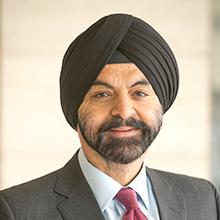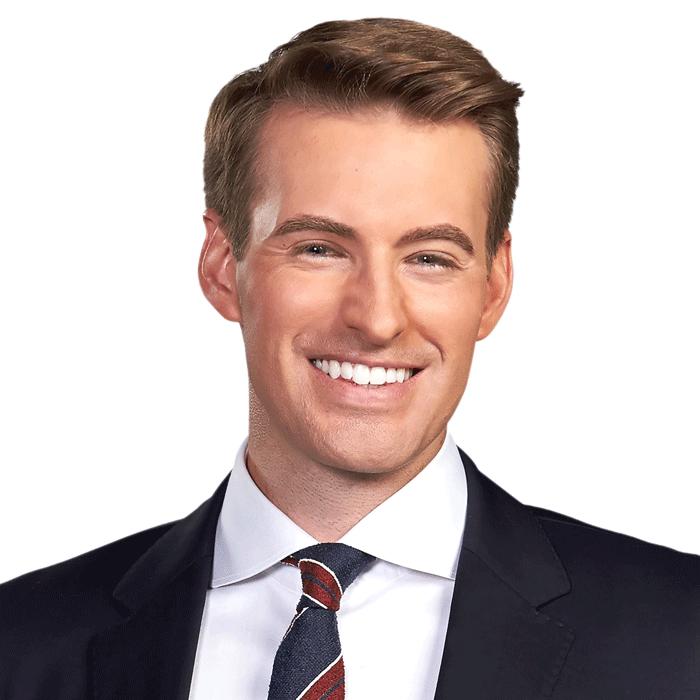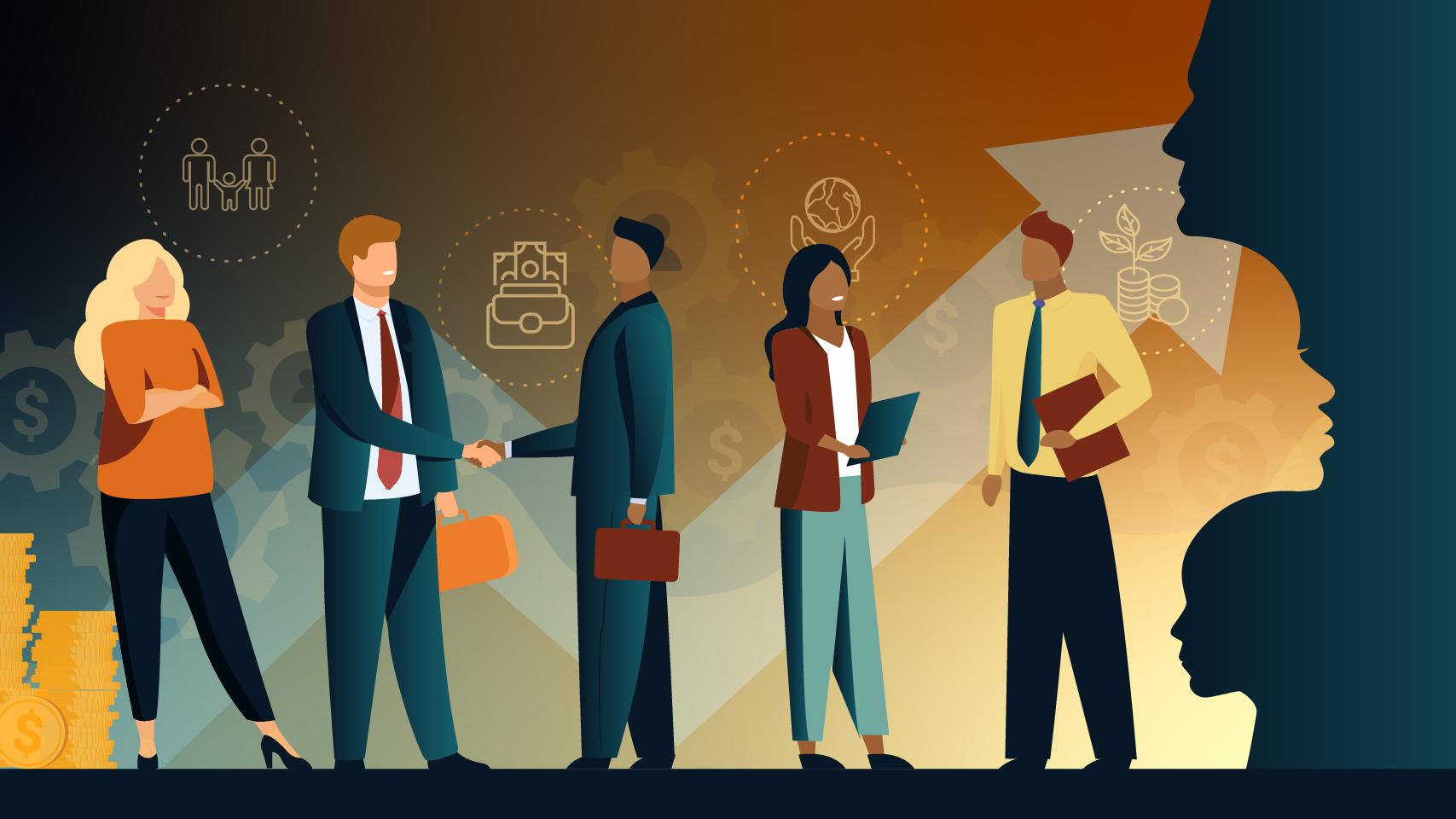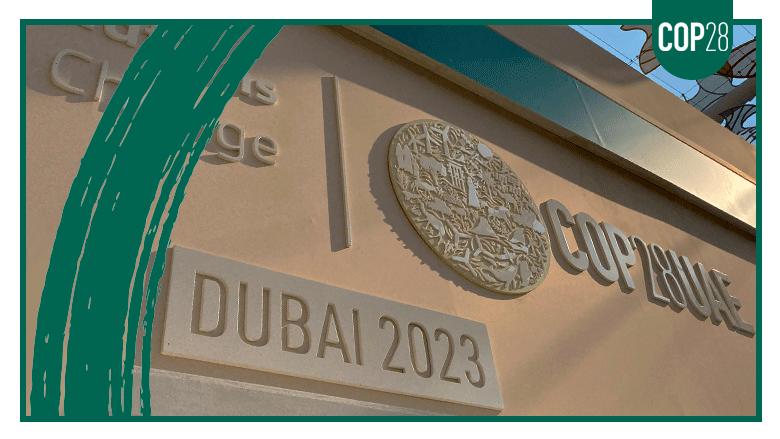[Dan Murphy] Thank you again. Ladies and gentlemen, Ajay Banga. Please make him feel welcome. [audience applauds]
[Ajay Banga] Thank you.
[Dan Murphy] Great to have you here. So we've just finished up the conversation with two global banking leaders. Let's get a perspective on the world from the World Bank. Ajay, so good to have you back in the UAE. I think we can begin our conversation by just getting a broad view on how you see the outlook for the rest of the year. We were speaking with the global bankers about some of the growth numbers and what to expect, but what would you say is the biggest challenge to the global business outlook right now?
[Ajay Banga] I think there's two things to think about. The first is all the challenges of instability across the region here, of course, with what's going on in Gaza, but also the challenges of Ukraine. When you put those two together and the Red Sea, and you add these variables into what already is turning out to be probably the lowest growth of the last 35, 40 years in the world, you put those two factors together, and that's something we've got to keep a close eye on. I believe that without real economic growth, as I said a little while ago, you cannot have prosperity and you cannot have peace. Peace and prosperity come with growth, and that's really important.
[Dan Murphy] You and I have also spoken quite a lot in the last couple of months about how the World Bank is evolving and adapting to some of these challenges, internally in particular, but also externally. Let's start internally. What changes are you putting in place to adapt?
[Ajay Banga] I think what my assessment from listening to clients of the Bank, as well as listening to employees in the Bank, was that the Bank needed to get two or three things done right. The first one is the speed and turnaround time of the things we work on. To give you an example, it takes us, on the average 19 months from the time we start discussing a project with a country,’ all the way to the time it gets approved by our board. And then it takes another nine to ten months before the first dollar goes out the door. Now, that second part has a lot to do with the capacity of those countries to absorb projects and get their own approvals. But the first part, the 19 months, is ours. There's good reasons for some of the time these things don't get done in two months, but 19 is way too long. What I'm aiming for is to get down to 12 by the end of the year. We're already down by two months, from 19 to 17. We've got a little time to go. We're going to get a 12. I don't know if I'll get a 12 or I'll get to 13 or 14, but I'll get to a much lower number than 19. That's the first task. To me development delayed is development denied, and we have to change this. The second task is to invest in the capacity of those countries so that the nine months that they take in turn to get approvals, and then sometimes the years it takes to complete a project can be brought down. There we have these amazing subject matter experts in the Bank in different topics. You want to discuss water, we've got hundreds of people who understand all aspects of water. Getting these people to be available to devote their time to building capacity in the receiving country is the second big part of what I'm trying to do. Just as one set of things. There's other things of this type, Dan. We're working on different aspects of how we cooperate inside the institution, across the different parts of the institution. We have the IBRD and IDA, which are the lending arms for the poorer countries, middle income countries. We have IFC, which works with the private sector. We have MIGA, which provides sort of political risk guarantees. The idea is to get these three to work much better together so that clients don't have to go to three places in the Bank for one project. To start out with, starting in July in 20 countries, we are putting the management teams together and creating a single window to the entire World Bank group, starting in July. If that does well, we do it more. Things of that nature, changing the incentive systems inside the Bank to drive this idea of working across silos is a large part of what we're trying to.
[Dan Murphy] What can you tell me… Sorry to interrupt. What can you tell me about some of the opportunities and the projects that you're working on specifically in the region today? And how is the World Bank really moving the needle in this part of the world?
[Ajay Banga] That comes to the outside angle as compared to the inside. I think the most important thing we've done is to change our vision from being only in the business of eradicating poverty to saying, we will help to eradicate poverty, but we will ensure that it's a livable planet. Meaning caring about pandemics, climate change, fragility, conflict, violence, soil degradation, forestry loss, biodiversity. You cannot imagine eradicating poverty without tackling these intertwined challenges. To give you an example, in Dubai a few months ago at COP28, we put out a whole series of things on what we would do in the green space. One example. I'll give you the four or five things we announced. The first one was we would put 45% of our financing into climate-related financing, half for adaptation and half for mitigation. Why that? Because the climate fight is not just about working on emissions from energy. It's also about helping countries who are at the receiving end of this problem manage their circumstances. From building climate resilient agriculture, to caring about the kinds of highways and schools and hospitals that you build that can be used through difficult times, to caring about digital education that can continue to deliver education even when a country is shut down due to a catastrophe. These are all adaptation. People call them climate money. They're actually health, education, clean air, clean water. Climate has just become a word to reflect actually what is a cause of development, basic social development for people. That was one announcement. A second one was we wanted to connect 100 million people in Africa to power by 2030. 600 million people in Africa have no access to power. None. Power is a basic human right. Connecting 100 million people by 2030 will require some money from our balance sheet, some money from the governments where we are going, but a substantial amount of money from the private sector. That's part of what we are trying to do as a second commitment. A third one was to attack methane. Not just the methane from oil flaring and losses in distribution, but from rice paddy cultivation, from the management of livestock, and from waste management. These don't require trillions of dollars. They are doable. We have projects that make sense. We know the numbers. We understand how to make it work. The question is to get them to scale in more countries. That's the third commitment. And the fourth one was to work on helping small states be able to survive a climate catastrophe. Meaning if they go through a catastrophe, even if you're a middle-income country like Barbados, where Mia Mottley is the prime minister and as a friend, she would lose double digits of her country's GDP in a few hours with a climate catastrophe. What the Bank will do at that time is suspend all debt repayments, capital and interest, for two years and absorb that cost out of our own income and balance sheet, so that she can focus on her people and not repaying our loans for those two years. And then the last item is a voluntary carbon market for forestry, where we are involved with the forestry projects in an effort to certify the environmental and social integrity of those credits, so we can create a real market in these, so money can flow from the developed world to the developing world in a voluntary way. That's just one set of examples.
[Dan Murphy] The financing commitment out of COP was extraordinary. I remember when the World Bank made that announcement, 45%, up from 25%. One of the questions I was asking at the time was, where is the money going to come from? And secondly, how secure is that financing, particularly if we saw a change of leadership in the United States, for example?
[Ajay Banga] The financing is coming mostly by… Remember, when you say climate financing, if half of it is adaptation, adaptation includes healthcare and education and hospitals and schools and infrastructure and roads. That actually is just understanding where our money should go and ensuring that it's targeted to real climate adaptation. That's one important aspect of it. The second part of it is we are going through a series of capital adequacy measures which have been set up as a result of the G20 Export Framework. That's raising new capital. In fact, we're sitting in the UAE, which is a generous contributor to that kind of new capital [inaudible].
[Dan Murphy] What do you see is the most immediate near-term funding challenge?
[Ajay Banga] I think the real issue here is… At COP28, we talked about a large amount of funding to go into renewable energy. We talked about creating a loss and damage fund for the future. This is going to require large amounts of money. The reality is the developed countries of the world no longer, currently at least, have the fiscal headroom to be able to put large sums of money to work on something like this. To me, that is a big challenge. I think one of the better ways of thinking about this, aside from what we can do with leveraging our own balance sheets, is to think about what to do with the private sector. There is a lot to be done with them. We've created a private sector lab which is helping us understand what we can do better to help them put trillions to work in these countries. I think that's going to be mission critical to what we do. We cannot rely on government balance sheets and multilateral development balance sheets only to get this done.
[Dan Murphy] How do you incentivize and de-risk that for the private sector?
[Ajay Banga] There's a series of things that they talk to us about, and the first one really is, if you really want me as a private investor to put money to work in a country, I need to have some degree of regulatory policy certainty. It's shocking how often they don't get that. I think, therefore, one of the tasks… And the Bank is good at working with countries on providing regulatory policy clarity. It doesn't get done in a hurry. It takes years. It takes discipline and dedication, but it's a very important part. I give the example very often of how, in India, as an example, Prime Minister Modi in his first term, said, I'm going to go to 30% renewable by 2030 by setting that out and by creating a certain sets of regulatory policies. Not everything that the private sector wanted was what he did. He has his own tradeoffs to make, but he made a certain set of announcements. Today, India's installed capacity is at 40%. The generated capacity is still not at 30% because they still have to complete the technology and the connectivity to the grid for some of that capacity. But they've got six years to go. They will get there. The power of regulatory clarity is second to none for a private sector investor. The second part is the political risk guarantees that you might still need over and beyond that. That's where the World Bank can be useful. We have institutions called MIGA inside the Bank that does this. We're today doing about six to $7 billion a year of guarantees. Our ambition is to get to three times that number by 2030. The third big issue is foreign exchange. If you're investing in dollars and yen and you're going to get paid in local currency, and typically a renewable energy project is a 20, 30 year investment. That's a large, unhedged exposure. To try and get past that is some of the work we are currently doing, saying, can we be part of that solution? Can the private sector investor take the first risk? Can the country, which is receiving the money, take some portion of the risk beyond a foreseen amount? And then for the tail risk, which nobody could calculate, can we step in and absorb it? There are ways to do this in a way that de-risks not the natural risk which the private sector should bear, but the unpredictable risk to get them over the edge, to bring the money in.
[Dan Murphy] And moving that capital in the right direction will be really important moving forward. Ajay, we only have a few minutes left, so I also wanted to focus on what you're going to be looking at next here. The World Bank now in its 80th year, which is just extraordinary, really. I think what we've seen under your leadership in the last few months has been that reset internally that you spoke about, but also a total refresh on the World Bank's role and mission around the world. What do you see as the biggest challenge to fulfilling your mandate right now, and what should we expect to see from the World Bank in the months to come?
[Ajay Banga] The good news is that I'm not 80 years old personally yet, but I'm getting there. The Bank's 80 years old, but the Bank has an incredible team of people. If you want subject matter expertise on development from primary education to skilling, from water to renewable energy, from rice paddy cultivation with lower methane to waste management, you name it, the Bank has people who not only are knowledgeable, but have worked and lived with their families in very difficult circumstances around the world and garnered enormous experience. That, to me, is the starting point of the institution, and it's the strength of the institution. Finding a way to enable them to focus on where our priorities should go in the coming period is my task. I define that, as I said, eradicating poverty on a livable planet. Focusing on women and young people. Women, because that's half the population, and if you enable them to participate in a productive way in our society, you change the entire dynamic of growth in the coming 10 to 20 years. The second, the youth, is because the global south is full of young people, more so than other countries. They describe that as a demographic dividend. And I think that's true if these young people get access to clean air, clean water, health care and education when they're growing up, but then most importantly, a job when they're eligible. I think if you don't do that well, then that demographic dividend runs the risk of becoming a very serious demographic liability for all of us. I think, therefore, focusing on women and focusing on young people is mission critical for the next decade and two. That's kind of the first definition. The second part of what we are trying to do is to work better with the private sector, we talked about that, but also work better with other multilateral institutions. We need to get all shoulders to the wheel. And after me, Kristalina is coming on stage. You can ask her how we are trying to work together. Tedros is sitting in the audience. Ask him or what the World Bank and the WHO are trying to do together. Ask my partners in the multilateral banks and multilateral institutions. We have to join ranks and work together. We don't have a choice. As far as I'm concerned, the best way to do that is to create one-on-one partnerships with them that focus on a few priority areas each and then go after them every six months at our level. That's the kind of thing I'm trying to get done. All of this adds up to many different things, but one thing you should think of is, I am here to fix the plumbing. That's what I tell everybody. It's not the world's most ambitious aim, but it is very important. The Bank has to be set for the next 30, 40 years from what was a rich and storied history to where it needs to be for the next 30, 40 years. That's what I think me and the management team are dedicated to.
[Dan Murphy] Absolutely fascinating. Your Highness, your excellencies, ladies and gentlemen, I want you to thank again Mr. Ajay Banga for joining us on stage at the World Government Summit. Sir, thank you so much. [audience applauds]
[Ajay Banga] Thanks.
[Dan Murphy] Appreciate it.
[Ajay Banga] Thank you very much.





